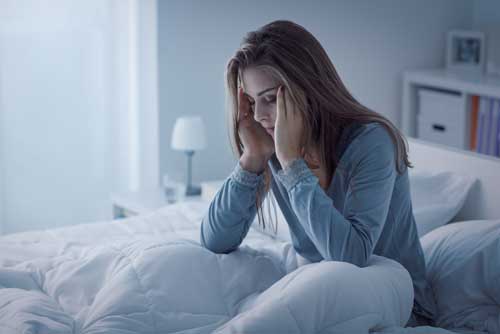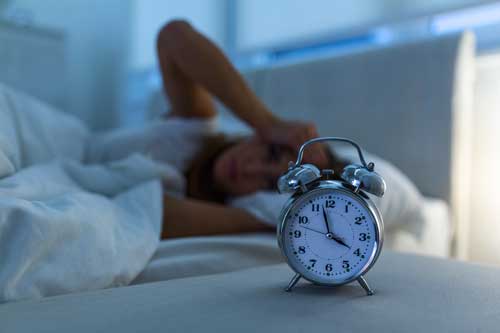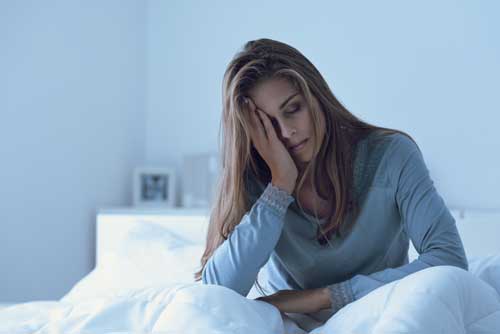Can Alcohol Cause Insomnia?
According to the latest estimates, 50 to 70 million Americans are affected by sleep or wakefulness disorders. Insomnia is the most commonly reported sleep disorder. Thirty percent of adults experience short-term insomnia and 10% of adults are impacted by chronic insomnia.
If insomnia is left untreated, it can lead to alcohol use disorders in some individuals. In a survey of the general population, 30% of American adults with chronic insomnia reported using alcohol as a sleep aid within the past year.
Currently, 5.8% of American adults are estimated to have an alcohol use disorder. Patients with alcohol use disorders tend to have a higher risk of insomnia, especially if they are going through alcohol withdrawal or the early stages of recovery.
Many people wonder, “Can alcohol cause insomnia?” The connection between alcohol and insomnia is complex, and it is not completely understood. This guide will explore the alcohol and insomnia connection more closely and provide information about treatment options.
What Is Insomnia?
Insomnia is a health condition in which a person has trouble falling asleep or staying asleep. While the condition usually lasts for a few days or weeks, people who struggle with chronic insomnia could have symptoms for months or years.
Overall, insomnia is more common in women, and the risk of insomnia increases with age. In the United States, researchers estimate that at least 30% of the adult population is affected by some form of insomnia, and 10% of affected individuals deal with chronic insomnia.
What Are the Symptoms of Insomnia?

- Waking up earlier than the desired time
- Waking up in the middle of the night and being unable to get back to sleep
- Feeling tired upon waking
- Fatigue or sleepiness during the day
In addition to its impact on the sleep cycle, insomnia can affect physical and mental health, especially if it continues for an extended period. Patients could develop some or all of these symptoms:
- Headaches
- Stomach discomfort
- Heartburn
- Irritability
- Depression
- Anxiety
- Concentration difficulties
Can Alcohol Cause Insomnia?
Some people may develop symptoms of insomnia after drinking alcohol. In fact, studies show that alcohol use can contribute to both short-term and chronic insomnia. Although roughly 20% of Americans drink an alcoholic beverage to help with falling asleep, research indicates that light drinking, moderate drinking, and alcohol use disorders are associated with sleep disturbances. Even a single alcoholic drink could be enough to disrupt a person’s healthy sleep cycle.
What Are the Stages of a Healthy Sleep Cycle?
A healthy sleep cycle includes both rapid eye movement (REM) sleep and non-REM sleep. Every night, a person cycles through five different stages of sleep that alternate between rapid eye movement sleep and non-REM sleep. While non-REM sleep has several stages, REM sleep is a single stage.
Stage One (non-REM)
Lasting around seven minutes, stage one happens when a person first falls asleep. The heart rate, brain waves, and eye movements slow down, and the body enters light sleep.
Stage Two (non-REM)
Eye movements stop in this stage, and the heart rate continues to decrease. Breathing slows down, and body temperature drops. Initially, brain waves increase in this stage, and they become less active during later portions of the stage. People spend most of the sleep cycle in this sleep stage.
Stage Three (non-REM)
This is the first stage of deep sleep. The heart rate, respiration rate, and body temperature decrease to the lowest levels during this stage, and brain waves show the least activity at this point. The muscles are incredibly relaxed. When a person is in this stage of sleep, it is particularly difficult to wake him or her up.
Stage Four (non-REM)
During this stage, the body grows and repairs tissues, and it also releases hormones. This stage is known as “the healing stage.”
Stage Five (REM)
This is the rapid eye movement stage. As the name suggests, the eyes move rapidly during this stage, going from side to side beneath the eyelids. Breathing, heart rate, and blood pressure increase to levels that are almost as high as those of a person who is awake. People are most likely to dream during REM sleep.
The first REM stage occurs around 90 minutes after a person falls asleep, and REM sleep occurs again every 90 minutes throughout the sleep cycle.
How Does Alcohol Alter a Person’s Sleep Cycle?

Overall, people who drink alcohol before bed may end up sleeping for a shorter length of time than they would have if they had not consumed alcohol. Their sleep quality is reduced, and they are likely to have several disruptions in their sleep throughout the sleep cycle. Since alcohol is a diuretic, it may cause people to wake up earlier in the morning, and they may wake up several times to use the bathroom overnight.
Can Alcohol Use Disorders Cause Sleep Disturbances and Chronic Sleep Issues?
Alcohol use disorders do not always cause insomnia, and insomnia itself does not cause alcohol use disorders. However, people with alcohol use disorders tend to have higher rates of short-term and chronic insomnia than individuals without alcohol use conditions. Compared to people without insomnia, individuals with insomnia have a higher risk of developing an alcohol use disorder.
In patients with alcohol use disorders, insomnia has been reported at rates that are 25% to 72% higher than insomnia rates in the general population. Alcohol is the most commonly used sleeping aid. In one study, 28% of participants with insomnia reported using alcohol to aid sleep. At follow-up appointments one year later, the participants who experienced at least two weeks of insomnia during the previous year had a higher likelihood of meeting the diagnostic criteria for alcohol use disorders.
In patients with alcohol use disorders, insomnia frequently occurs during alcohol withdrawal. After the withdrawal process is complete, patients who are at an early stage of their recovery could still experience insomnia symptoms, including a decrease in overall sleep time and an increase in the time it takes to fall asleep. Some patients may continue to struggle with insomnia after they achieve abstinence from alcohol.
How Are Alcohol Use Disorders and Insomnia Treated?
In cases where alcohol use disorders and insomnia are both present, experts suggest that the patient is treated for both at the same time. Insomnia could increase the risk of relapse for people who are in alcohol withdrawal or alcohol use disorder recovery.
Lifestyle modifications, behavioral therapy, and medications are the standard treatments for insomnia. These treatments tend to work very well in patients who have short-term insomnia after drinking alcohol on an infrequent basis. In patients with both alcohol use disorders and insomnia, some of the standard medications are not recommended because of the risk of physical dependence and withdrawal symptoms. Sedative-hypnotic medicines, including zolpidem, could be particularly risky for these patients.
Cognitive-behavioral therapy, biofeedback, relaxation training, sleep hygiene therapy, and stimulus control therapy are a few of the behavioral therapy techniques that may be effective for patients with insomnia and for patients with alcohol use disorders and insomnia. Light therapy and sleep restriction could be appropriate as well.
Where Can I Get Treatment for Insomnia That Occurs With Alcohol Use Disorder?
Inpatient treatment facilities provide treatment for alcohol use disorders and co-occurring conditions, including insomnia. Depending on overall health and circumstances, some patients may be candidates for outpatient treatment and therapy.
With inpatient and outpatient treatment, participants receive care for their physical, mental, and emotional health. Medications help make the alcohol withdrawal (“detox”) process more comfortable. Group and individual counseling sessions help patients make gradual changes in their habits and behaviors so that they can successfully abstain from alcohol.
Harmony Place is a residential treatment center in Los Angeles, California. At Harmony Place, you receive dual diagnosis treatment, and the staff uses a holistic approach. Physicians and psychiatrists are directly involved in your care, and you receive three individual therapy sessions each week.
Start the Journey At Harmony Place
Understanding the link between alcohol and insomnia is crucial for those seeking effective alcohol addiction treatment in Los Angeles, CA. At Harmony Place, we offer a variety of therapies designed to address both the physical and psychological aspects of alcoholism. Clients can benefit from innovative treatments such as equine-assisted psychotherapy, art therapy, acupuncture, and massage. Our specialists are skilled in various therapeutic approaches, including dialectical behavior therapy (DBT), eye movement desensitization and reprocessing (EMDR), psychodrama, and somatic experiencing, providing a comprehensive path to recovery.
For individuals engaged in outpatient care, Harmony Place offers an extended outpatient treatment program, accommodating the diverse needs of those recovering from being addicted to alcohol. This program includes access to transitional housing, which plays a vital role in minimizing stressors that could jeopardize progress. Harmony Place takes BCBS insurance and accepts Aetna plans, ensuring that clients have the necessary support to focus on their healing journey without financial distractions.
Our dedicated admissions specialists and staff are available to guide you through the process of understanding your insurance options at Harmony Place, including Cigna alcohol rehab treatment and Anthem insurance coverage. We know the importance of addressing the average cost of alcohol addiction treatment and are committed to making paying for alcohol recovery treatment as straightforward as possible. Reach out to us today to learn more about our diverse treatment programs and begin your journey toward a healthier, alcohol-free life.
References:
https://www.nhlbi.nih.gov/science/sleep-science-and-sleep-disorders
https://www.sleepassociation.org/about-sleep/sleep-statistics/
Articles Related to Alcohol Use Disorder and Addiction Treatment
- 10 of the Most Common Causes of Alcoholism
- Alcoholism and Obesity: Is There a Connection?
- How Long Does Alcohol Stay in the Body?
- Drug Misuse, Alcoholism, and Disability
- Warning Signs of Alcohol Abuse in Teens
- The Link Between Alcohol Abuse and Anxiety
- Can Alcohol Cause Dementia?
- Alcohol and Weight Loss: Can You Drink Alcohol and Still Lose Weight?
- Can Alcohol Cause Insomnia?
- Baclofen And Alcoholism Treatment: Will It Work?

